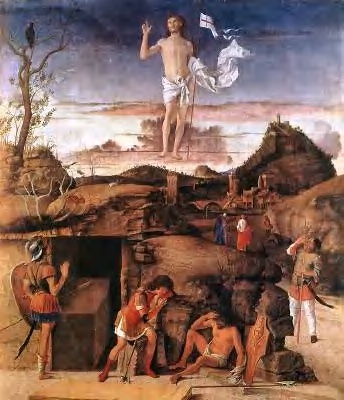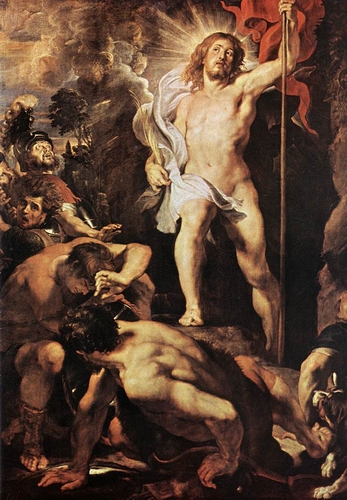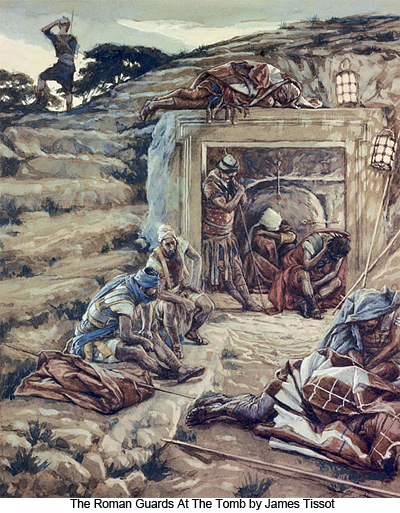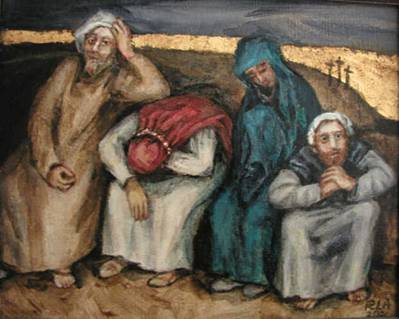This is the third chapter of the redone second part of a trilogy that I have been writing about the Roman Centurion known as Longinus who was at the cross when Jesus was crucified. I have tried to weave other characters from the Gospel narratives, including the Centurion whose “beloved servant” was healed by Jesus an account mentioned in both Matthew and Luke, where the Greek word for servant “pais” is only found in these accounts and is different from the word commonly used in the New Testament “doulos.” The difference leads to some interesting and potentially powerful understandings about the people that Jesus interacted during his earthly ministry.
The links the to preceding chapters are shown below. I will be doing a final section to the trilogy dealing with what I imagine happened later to the men in the narrative. The reason I am doing this is because I believe that many Christians cannot imagine what it must have felt like to be the Roman occupiers of Judea in a time where they were hated and deep divisions, religious, cultural and political complicated the lives of Roman officers like the Centurion known as Longinus.”
Part One: A Centurion in Jerusalem
A Centurion’s Sunday in Jerusalem: The Story of Longinus
The Story of Longinus the Centurion: A Meeting of Friends
The Story of Longinus the Centurion: A Visit to Death Row
Duplicity in Jerusalem: An Official Visit and 30 Pieces of Silver
Part Two: An Unenviable Mission
The Long Good Friday of Longinus the Centurion
The Morning After a Most Unsettling Crucifixion: The Story of Longinus the Centurion
I do hope that you enjoy the series and that it and the Gospel narratives challenge you whether you are a Christian or not. I know from my time in Iraq serving with our advisors to the Iraqi forces that what the Roman officers dealt with was more difficult than any of us could imagine, unless you have been a soldier or officer of an occupying power.
Peace and Happy Easter…He is Risen!
Padre Steve+
The pounding on his door awakened Longinus before he expected on this day after the Jewish Passover. He was hoping perhaps beyond hope that the worst was over and that in a few days he could take his soldiers back to the confines of Caesarea and away from the troubled city of Jerusalem. He was tired of this duty and longed for service with a real Legion with real Roman soldiers. He wiped the sleep from his eyes and went to the door of his quarters in Fortress Antonia. He opened the door to find his Optimo, or second in command Decius, with a look of near panic on his face.
He asked the young officer to come into his quarters and take a seat at his table. They like the other officers had seen events that they could barely explain. some of those events had troubled Longinus in a manner in which he was not accustomed.
Longinus took a wineskin and poured the contents into two cups. He asked Decius what was so urgent and frightening that he had to be at his quarters well before the duty day began. The young man took off his helmet to reveal a crop of blondish brown hair common to the Tyrol in the northern part of Italy and told an almost unbelievable story. He explained that there was trouble at the tomb of the itinerant preacher named Jesus.
The two guards from their unit who had relieved the previous watch at the tomb had evidently fallen asleep and there had been a break in. They claimed that they had been overcome when some kind of angelic being who had descended in front of them and some of the women who had been at the execution site previously. The story seemed preposterous but Longinus could not believe that they had fallen asleep on duty either as such could be punished by a death sentence. Adding to the confusion was a report that two of the preacher’s “disciples” had reportedly entered the tomb and claimed that the body was gone as had some of the women that had been there at the crucifixion. It was unbelievable but yet in light of the strangeness of the man and his execution. Longinus had Decius bring the two soldiers to him along with the Sergeant of the Guard to explain what had happened.
The two soldiers, one a Samaritan and the other a Greek had good reputations in the unit. Neither had given him cause for concern and the terrified expression on their faces as they explained what happened gave Longinus reason to believe them. Yes it was possible that they were lying but Longinus believed their story. He threatened them and promised a light punishment if they only told the truth, but despite this they stuck with this outrageous story.
Longinus was not much of a believer in miracles angels or any sort of magic hocus pocus purveyed by seers, magicians or fortune tellers. that being the case here he was believing this outlandish story because to disbelieve would mean that there was a serious breakdown of discipline by two outstanding soldiers. He had some soldiers that he wouldn’t believe for an Athenian minute if they told him such a tale but he believed these men. The terror on their face as they told the story led Longinus to believe that they had to be telling the truth as improbable as it was.
Longinus again thought of his words as the darkness enfolded the city and the earth quaked preacher hung dying on the cross on that evil hill two day before.
Longinus went to Pilate’s headquarters when he and the other Centurions, including his friend Flavius were participants in a meeting with the High Priest and his representatives and two of Herod’s people.
The meeting reminded him of a meeting of criminals. The High Priest and his representatives were livid and Herod’s henchmen voiced their displeasure regarding the lapse of the Roman soldiers that allowed this to happen. Longinus spoke for his men and said that as improbable as it was that he believed their story. That only made the non-Romans angrier; he almost thought that they were engaging Pilate in some histrionic episode in order to force Pilate to do their bidding. They insisted that Longinus’ soldiers had to have fallen asleep and or that they had conspired with the preacher’s followers to remove the body from the tomb. This angered Longinus to the point that he interrupted their ranting to defend his men’s honor. Pilate finally ordered Longinus and the High Priest to be silent. He asked the non-Romans to step outside while he conferred with Longinus and the other Centurions.
Pilate explained his dilemma. He was afraid that if he sent the High Priest away by supporting his soldiers that there would be a revolt in the streets. He had seen the tumult on the streets by the supporters of the High Priest when he tried to release the “King of the Jews” and felt that this would be worse for security. He advised the Centurions that while he had no reason to doubt them or their men that he had to placate the High Priest and Herod in order to avoid chaos, chaos that could lose him his job if he wasn’t careful. Likewise he did not feel that he had the manpower in the city to handle a full-fledged revolt and that he would have to call for reinforcements from the Legions based in Syria, something that he was loathe to do as this would get back to the Emperor.
Longinus thought back to the day of the execution. Pilate had agreed to place a guard at the tomb at the urging of the High Council. Longinus had argued against placing any soldiers at the tomb as he felt that since the “King of the Jews” them man that he had called the “son of God” was dead that Rome’s obligation was over. The whole thing reeked of politics.
Longinus was overruled by Pilate who explained that Roman soldiers needed to guard the tomb because the High Priest who Longinus detested as much as Pilate insisted that Jesus’ followers would attempt to steal the body and claim that he had been raised from the dead to lead a revolt against the Council and eventually Rome itself.
Added to the Judean witches’ cauldron was the presence of Herod Antipas, the corpulent and corrupt “King” of Judea. If Longinus detested Pilate and Caiaphas he hated Herod and all that he stood for, it made him wonder why Roman lives and treasure were spent to solve the problems of this God-forsaken land which he believed would still be trouble two millennia from now if the world lasted that long. Longinus believed that as long as Rome allowed the High Council and Herod to rule the region by proxy that the troubles would never end. He believed that it was only a matter of time before these people, led by the Zealots would revolt as they had against the Seleucids nearly 200 years before. He knew if that happened that Rome would crush the revolt and not leave as much as a house standing. He hated this occupation and all that it stood for, especially when he saw a good man, an innocent man killed for no good reason other than the politics of it all. It sickened him.
When he was done explaining his decision to Longinus and the other Centurions Pilate now called the quite irate non-Romans back into the proceedings. He told the High Priest and Herod’s men that he would disciple the soldiers involved and he would assist them in finding just what parties removed the body from the tomb. In the mean time he would suppress any stories coming from the soldiers about this supposed “resurrection.”
The High Priest and Herod’s men agreed that this would suffice and thanked Pilate for his time and effort. Longinus and the other Centurions quietly seethed as this took place. When the non-Roman parties had left Pilate ensured the officers that no action would be taken against the men and that he would not actively assist the Jews in trying to find the perpetrators of the event. He then let the officer know that they would remain in Jerusalem for another week to allow the multitude of pilgrims to leave the city and then they would return to Caesarea. Longinus thought and for a brief moment admired Pilate’s duplicity. Pilate the consummate politician had again found a way to defuse the situation. As much as he despised the deal it was better than trying to deal with a full fledged rebellion with so few troops available in Jerusalem.
Longinus left with the others and met Decius and Flavius and stepped into the court of the fortress. He was very unhappy with the deal that Pilate made with the High Priest and Herod. He felt that he had dishonored his soldiers and the unit for the sake of political expediency. He felt ashamed of the Empire for what Pilate had done in cooperating with these people from beginning to end during this affair. He would not forget.
That night he felt compelled to walk to the empty tomb with Flavius. In the darkness they looked into the sepulcher aided by a lantern. They saw the grave cloths where they remained; the large stone was rolled away and the seal that had been placed on it was broken. They looked for any evidence to suggest that the soldiers had fallen asleep but could not find any. Nor did either see how anyone could have stolen the body and gotten very far without being seen by anyone. Convinced by what they saw they set down in the tomb.
They sat silently and wondered. Finally Longinus asked Flavius. “You believe in this Jewish God, what do you think?”
Flavius sat for a moment staring silently ahead at the stone wall of the tomb. Finally he spoke “My friend, I believed something was different about the Galilean when he healed my servant, even though I’m sure that he knew that my servant was more than a servant to me.”
Longinus thought for a moment. “Friday morning I would have told you that the man was a simple but probably misunderstood Jew. Tonight I do not know.” He paused. “Perhaps he is the son of God, or whatever I said on that hill.”
“I believe that he is some kind of God my friend, one who may change all of our lives.” Replied Flavius.
“My friend, I really do not know what to believe anymore. Let’s get out of here and get back to Antonia, at least we can drink there.”
Longinus looked at ground where the body had been placed. In the dim light he noticed what appeared to be some thorns. He reached down and picked up the crown of thorns that had been on the Galilean’s head.
Flavius looked at him and said “the crown, how fitting that it was left here.”
“Somehow fitting. Maybe we should take it? Who knows maybe it will be worth something someday?” Responded Longinus.
“Maybe so my friend, maybe so. But maybe you should keep it to remind you of him.”
“No you take it. I have the Galilean’s blood on my spear. That is enough a reminder for me.” Longinus handed the crown of thorns to Flavius and they walked into the night out of the tomb, their path lit by their lamp.
They walked back to the fortress when both men went to the tavern in Officer’s Mess and had the barkeep pour them each an ale. He drank quite a few before the evening was out, Flavius leaving before him. he remained alone for hours and then went to his quarters where he lay down exhausted and perplexed by the events of the past few days.








